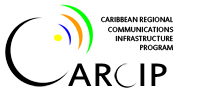Geothermal Energy and its Prospects for Future Development
Geothermal energy is among the several forms of renewable energy technology that is applicable to many countries of the Caribbean. Geothermal energy is derived from natural heat from underground reservoirs, which consist of hot water or a mixture of hot water and steam. This area beneath the earth’s surface coincides with the boundaries of the earth’s tectonic plates.
Geothermal Energy Cycle
Precipitation seeps deep into the earth where it is warmed by the earth’s heat. In a few places magma occurs close enough to the surface to heat fluids that can be reached by drilling wells. The hot water is then brought to the surface, flashed to steam and delivered by pipeline to electricity-generating plants. In instances where the geothermal energy produces natural steam, the steam is scrubbed to remove impurities before transmission to the power plant. Excess fluids are returned to the reservoir.
One of the main geological features of geothermal possibility of an island is its volcanacity. A geothermal system can be characterised by four basic elements. They include (1) a heat source, which is usually volcanic in origin; (2) reservoir rocks, which are normally comprised of dense formation that have been highly fractured; (3) circulation of fluids inside the reservoirs that transmit heat from depths to the near surface; (4) an impermeable cap rock, which provides an imperfect seal over the geothermal system to limit the amount of surface discharge and allows heat to accumulate.
The explanation of geothermal resources requires a variety of geo-scientific methods. Among the methods used are geological analysis, geo-chemical surveys of thermal features and several geophysical techniques. Results of these surveys are used to choose exploratory drill sites for temperature gradient wells (which are sometimes required to measure subsurface heat) and for production of test wells. Production wells completed in vapour dominated reservoirs produce steam only, while those in liquid – dominated reservoirs produce a mixture of steam and water.
Typically these fluids occur at depths of up to 9,800 feet (3,000 metres) and can be tapped either directly at the surface or by drilling wells. Surface facilities convert (“flash”) a portion of fluid into steam, which is used to power turbines for generating electricity. Generally, subsurface reservoirs temperature must be at least 140 – 150°C (284 - 302°F) for electrical generation.
Flash Plant technology is generally used in geothermal energy production. In this process, geothermal fluid is flashed into steam inseparators near the wellheads, where brine and steam are separated. The brine is sent to an injection well and returned to geothermal reservoirs. The steamed goes through insulated line to a scrubber where condensation and impurities are removed. It is subsequently piped to turbines causing the turbines generator to spin at very high velocity thereby generating electricity.
Geothermal energy is a clean alternative source of energy. From an environmental stand point, it offers several advantages to fossil fuel in the generation of electricity. Fossil fuel plants emit green house gases such as sulphur dioxide (SO2), nitrogen dioxide (NO2), and Carbon dioxide (CO2) to the atmosphere, whereas geothermal emissions consist mainly of water. Geothermal energy has tremendous prospect for many Caribbean islands, which are largely volcanic in origin. Given the high cost of energy on the world market, geothermal energy offers an alternative energy source with substantial economic benefits. Successful exploration of the geothermal resources in St. Vincent and the Grenadines could satisfy a significant proportion of the island’s current as well as future needs. It is important to note, however, that geothermal exploration is costly.
Therefore, before any initiative is attempted, it is advisable that small developing states, like St. Vincent and the Grenadines, encourage private investors (through partnership agreements) who have the resources, technological capability and experience to pursue such a venture. The successful geothermal project in Guadeloupe should be an inspiration for countries in the region that are contemplating geothermal exploration.




